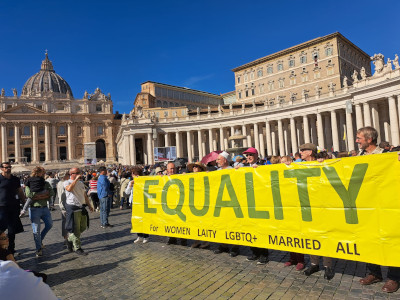Attention of: Cardinal Mario Grech
Secretary General of the Synod
Vatican City
CATHOLIC LAY LEADERSHIP SUBMITS CHURCH GOVERNANCE AND WOMEN DEACON REPORTS TO AID VATICAN STUDY GROUPS
Your Eminence,
The Wijngaards Institute for Catholic Research is happy to provide you with reports we have prepared, in Italian, to guide three of your study groups on the topics of women in ordained ministry and governance in the Church (including the selection of bishops).
Our founder, Rev. Dr. Johannes Wijngaards (1935 - 2025) was a Dutch priest and former Vicar General of the Mill Hill Missionary order. He was a contemporary of many of your brother Cardinals and Bishops, having obtained his Licentiate of Sacred Scripture at the Pontifical Biblical Institute and a Doctorate of Theology at the Pontifical Gregorian University in the early 1960s. He founded our Institute in service of the Catholic world, including by addressing errors and omissions in Catholic teaching and practice. Perhaps finally in his death, Rev. Dr. Wijngaards’ lifelong work will be given serious consideration by those appointed to offer recommendations on these matters.
The below listed international reform networks join with the members of the Wijngaards Research Institute for Catholic Research to submit to you:
1. Attention of Study Group #9: The “Proposed Constitution for the Catholic Church”.
The goal of the constitution is to offer Study Group 9 one possible way to integrate commonly proposed reforms into a legal framework that is coherent, pragmatic, as well as compatible with biblical studies, theological research, and ecumenical dialogues.
The constitution builds on that grassroots consultation, and it is the result of an interdisciplinary collaboration between bible scholars, church historians, theologians, canon lawyers, and scholars from other relevant disciplines.
The constitution also responds to the formal recommendation by the “Synodale Weg” (Synodal Way) of the Catholic Church in Germany that “the discussion on a Lex ecclesiae fundamentalis, and its norms which are fundamental for the legal system of the entire Church, [...] be rekindled and brought to a positive conclusion” (for the reference, please see the Overview document linked below).
The final draft of the constitution is the result of an interdisciplinary collaboration between bible scholars, church historians, theologians, canon lawyers, and scholars from other relevant disciplines, and has been endorsed by 67 academics from 17 countries.
Two documents for Study Group #9:
● Text of the Constitution itself at https://www.wijngaardsinstitute.com/costituzione-chiesa-cattolica/ (downloadable as PDF in Italian, English, Spanish, German, and French);
● Accompanying document, which includes both a Cover Letter for Study Group 9, and an Overview outlining the constitution’s background, precedents, key proposals, and main documentary sources (in canon law - both Catholic and of other Christian Churches - as well as in international/human rights law), available as a PDF at https://drive.google.com/file/d/1g8littF7g6L0YIOvXJvWuv9yiAv80jbF/view?usp=sharing.
2. Attention of Study Group #5: Research Documents on Women Deacons.
Our research has brought together what is arguably the largest collection of historical evidence and other material concerning women deacons for most of church history.
Many documents confirm that these ordinations took place by means of a rite substantially identical to the one for the ordination of their male counterparts: that is, their ordinations were by the imposition of the bishop’s hands and took place in the sanctuary, in front of the altar and during the Eucharistic Liturgy immediately after the Anaphora, just like for the ordination of male deacons, presbyters, and bishops. Several Popes authorised Sacramentaries containing ordination prayers for women deacons.
Document for Study Group #5: “A Documented Appeal to Request the Re-instatement of the Ordained Diaconate for Women”, available in Italian, Spanish, French, Dutch, German, and English at https://www.wijngaardsinstitute.com/diaconato-per-le-donne/.
3. Attention of Study Group #7: “Proposal for the Reintroduction of Episcopal Elections”.
This proposal is inspired by the pioneering yet concrete procedure advanced by Blessed Antonio Rosmini, as well as by the constitution of the Orthodox Church of Cyprus, and by the practice of other Christian Churches, such as the Episcopal Church (United States).
Two documents for Study Group #7:
● “Proposal for the Reintroduction of Episcopal Elections”, available at https://www.wijngaardsinstitute.com/proposal-for-reintroducing-democratic-elections-of-bishops-by-the-local-church/ (in English);
● Luca Badini Confalonieri, “The Election of Bishops by Clergy and People: Antonio Rosmini’s Neglected Solution.” Theological Studies 73, no. 1 (2012): 82–114, available at https://theologicalstudies.net/wp-content/uploads/2022/11/4-Confalonieri-Election-of-Bishops.pdf.
We would be grateful if you could forward the documents to the three Study Groups above mentioned, and we trust they will prove to be helpful aids to their synodal study and discussions.
We take this occasion to express our consideration and esteem in Christ.
Miriam Duignan
Executive Director
Wijngaards Institute for Catholic Research
CO-SIGNATORIES:
Australian Catholic Coalition for Church Reform
We Are Church International
Spirit Unbounded
International Church Reform Network
Catholic Church Reform International
Be the change
Root & Branch Synod



